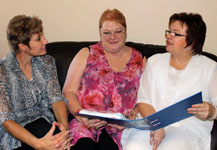UFS Faculty of Law and Department of Health join hands to combat modern day slavery
 |
At this event, were from the left: Dr Adri Krieger and Dr Mariaan Kotze. Both are from the Department of Health: Directorate Forensic Services. Far right is Dr Beatri Kruger from the Unit for Children's Rights and the Department of Criminal and Medical Law at the UFS.
4 October 2012 |
Research and court cases confirm that the trade in people is a reality in South Africa. According to Dr Beatri Kruger from the Unit for Children's Rights and the Department of Criminal and Medical Law at the University of the Free State (UFS), complex challenges are faced in combating human trafficking. One of these challenges is a lack of knowledge of this crime and the difficulty in identifying trafficked victims.
To address the lack of knowledge, a number of discussions took place between Dr Kruger and delegates from the Department of Health.
A project has been initiated to address this problem in the public health sector. A need to raise awareness and provide training to medical practitioners to better understand human trafficking was identified. The most important aim of this initiative is to empower medical staff, to identify trafficked victims that visit hospitals and clinics countrywide and to also treat them appropriately in light of the severe trauma they have often been exposed to. The initiative will also empower medical practitioners to refer patients to other service providers such as social workers and psychologists.
The talks with medical practitioners from the Department of Health have led to training and awareness raising that will be provided at some of the local hospitals before the end of the year. Further training seminars are planned for medical practitioners, which will include a presentation by Dr Kruger on legal issues that are relevant for staff in the public health sector. The multidisciplinary cooperation that was established between representatives from the UFS Faculty of Law and the Department of Health has contributed substantially to a more effective response to human trafficking in South Africa.